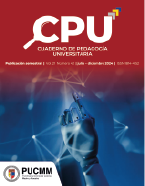Program of Neurodidactic Strategies for the Stimulation of Executive Functions in University Students
DOI:
https://doi.org/10.29197/cpu.v21i42.606Keywords:
strategies, executive functions, neuroeducation, university studentsAbstract
Executive functions promote cognitive processes to plan, organize, manage emotions and carry out other complex activities. Motivating their development in the educational context can be essential to achieve better learning. Therefore, the objective of this research was to analyze whether there is a relationship between teaching strategies based on neuroscience and the development of executive functions in university education students. The research sample was made up of N=129 students from the bachelor's degree program in Mathematics for Secondary Education, aged between 18 and 23 years, with an average of 20 years. They were chosen in a non-random or intentional manner from two ISFODOSU campuses (Salomé Ureña Higher Teacher Training Institute, public university of the Dominican Republic). A method with a quantitative approach was followed in a comparative descriptive design without a control group. The study was accompanied by a training program with 8 classroom interventions to improve executive functions with neurodidactic strategies (mindfulness, growth mindset, linking new knowledge with previous knowledge and socio-emotional skills). The Standardized Questionnaire for the Evaluation of Executive Functioning (EFECO) with 67 items was applied in two moments (pre and posttest) to evaluate the management of executive functions before and after the training program interventions. The main results demonstrate that the selected strategies can improve executive functions, since there are variations in the means and percentages of the tests implemented after the intervention plan, especially there was a greater improvement in the function of cognitive flexibility and planning. It is concluded that there may be a relationship between the selected strategies and the stimulation of executive functions; However, it is necessary to measure other factors and extraneous variables, as well as validate the possible impact of these strategies on the academic performance of students.
Metrics
References
Bausela, E. (2014). Funciones ejecutivas: nociones del desarrollo desde una perspectiva neuropsicológica. Acción Psicológica, 11(1), 21–34. http://dx.doi.org/10.5944/ap.1.1.13789
Desautels, L. (2016). How Emotions Affect Learning, Behaviors, and Relationships. Edutopia International Online Magazine, 97. https://digitalcommons.butler.edu/coe_papers/97/
Estrada, E. (2023). Fortalecimiento de la red de docentes en funciones ejecutivas para preescolar. Revista Académica Sociedad del Conocimiento Cunzac, 3(2), 59–68. https://doi.org/10.46780/sociedadcunzac.v3i2.91
García, A. (2015). Desarrollo y validación de un cuestionario de observación para la evaluación de las funciones ejecutivas en la infancia.?Revista Intercontinental de Psicología y Educación, 17(1), 141–162. https://psicologiayeducacion.uic.mx/index.php/1/article/view/149
Gil, J. (2020). ¿Es posible un currículo basado en las Funciones Ejecutivas? De la función a la competencia: propuesta de integración de la “competencia ejecutiva” en el aula. Journal of Neuroeducation, 1(1). https://doi.org/10.1344/joned.v1i1.31363
Gkintoni, E., Antonopoulou, H. y Halkiopoulos, C. (2023). Neurociencia Emocional y Aprendizaje. Una descripción general. Revista Technium de Ciencias Sociales, 39(1), 421–429. https://doi.org/10.47577/tssj.v39i1.8076
González, J., Castellano, D., López-Brea, N. y Cantero, M. (2023). Relación entre inteligencia y funciones ejecutivas en niños de siete años. Revista Iberoamericana de Psicología, 15(3), 73–82. https://doi.org/10.33881/2027-1786.rip.15307
Gutiérrez, A. y Montoya, D. (2022). Explorando la relación entre las funciones ejecutivas y la metacognición: ¿las primeras predicen la segunda? Praxis & Saber,?13(33), Artículo e12500. https://doi.org/10.19053/22160159.v13.n33.2022.12500
Kontostavlou, E. y Drigas, A. (2022). Capacitación en funciones ejecutivas y superdotación (Executive Functions Training and Giftedness). Retos, 43, 1005–1014. https:. //doi.org/10.47197/retos.v43i0.90151
Mejía, A. (2023). Relación entre inteligencia emocional, funciones ejecutivas y rendimiento académico en escolares. LATAM Revista Latinoamericana De Ciencias Sociales Y Humanidades, 4(3), 1153–1164. https://doi.org/10.56712/latam.v4i3.1139
Muchiut, A., Dri, C., Vaccaro, P. y Pietto, M. (2020). Emocionalidad, conducta, habilidades sociales, y funciones ejecutivas en niños de nivel inicial. Revista Iberoamericana de Psicología, 12(2), 13–23. https://doi.org/10.33881/2027-1786.rip.12202
Muriel, L. (1982). The Problem of Assessing Executive Function. International Journal of Psychology, 17, 281–297.?https://doi.org/10.1080/00207598208247445
Ordóñez, M. y Alonso, A. (2023). Las tecnologías digitales en el entrenamiento de las funciones ejecutivas: una revisión sistemática de literatura. RiiTE Revista Interuniversitaria de Investigación en Tecnología Educativa, (15), 120–136. https://doi.org/10.6018/riite.570521
Ospina, A. y Martínez, D. (2023). Implicaciones de la empatía en funciones ejecutivas de estudiantes con problemáticas de convivencia escolar. Pensamiento Americano,16(31), 1–15. https://doi.org/10.21803/penamer.16.31.607
Ramos-Galarza, C., Bolaños-Pasquel, M., García-Gómez, A., Martínez-Suárez, P. y Jadán-Guerrero, J. (2018a). La Escala EFECO para Valorar Funciones Ejecutivas en Formato de AutoReporte. Revista Iberoamericana de Diagnóstico y Evaluación – e Avaliação Psicológica. RIDEP, 1(50), 83–93. https://doi.org/10.21865/RIDEP50.1.07
Ramos-Galarza, C., Villegas, C., Ortiz, D., García, A., Bolaños, M., Acosta, P., Lepe, N., Del Valle, N. y Ramos, V. (2018b). Evaluación de las Habilidades de la Corteza Prefrontal: La Escala EFECO II-VC y II-VR. Revista Ecuatoriana de Neurología. 27(3), 36–42. https://www.researchgate.net/publication/332569795
Riascos, P., Estrada, Y. y Perugache, A. (2023). Relación entre velocidad de procesamiento y funciones ejecutivas en estudiantes de sexto grado. Informes Psicológicos, 23(1), 29–46. https://doi.org/10.18566/infpsic.v23n1a02
Rodríguez, A. y Cadavid, V. (2024). Relaciones entre lenguaje, funciones ejecutivas y metacognición. Revista de Psicología, 13(1), 45–73. https://doi.org/10.36901/psicologia.v13i1.1586
Suriel, A. (2020). Relación entre funciones ejecutivas y rendimiento en matemáticas en estudiantes de secundaria. En A. Paz, V. Figueroa, E. Rodríguez y A. Montes. (Coords.), Libro de Actas del 1° Congreso Caribeño de Investigación Educativa (pp.909 – 914). Instituto Superior de Formación Docente Salomé Ureña (ISFODOSU). https://biblioteca.isfodosu.edu.do/opac-tmpl/files/tc/CongresoCaribeno-909-914.pdf
Thomas, M., Ansari, D., & Knowland, V. (2019). Annual Research Review: Educational neuroscience: progress and prospects. Journal of Child Psychology and Psychiatry, and Allied Disciplines, 60(4), 477–492. https://doi.org/10.1111/jcpp.12973
Tomlinson, C., & Sousa, D. (2020). The Sciences of Teaching. Educational Leadership, 77(8), 14–20. https://www.ascd.org/el/articles/the-sciences-of-teaching
Tirapu-Ustárroz, J., Bausela-Herreras, E. y Cordero-Andrés, P. (2018). Modelo de funciones ejecutivas basado en análisis factoriales en población infantil y escolar: metaanálisis. Rev Neurol, 67(06), 215–225 doi.org/10.33588/rn.6706.2017450
Published
How to Cite
Issue
Section
License
Copyright (c) 2024 Los autores/as conservan los derechos de autor y ceden a la revista el derecho de la primera publicación.

This work is licensed under a Creative Commons Attribution-NonCommercial-ShareAlike 4.0 International License.
Unless otherwise indicated, all articles in this journal are published under a
Licencia Internacional Creative Commons 4.0 Atribución-NoComercial-CompartirIgual .
The authors retain the copyright and assign the right to the first publication to the magazine.









